Scroll down or use the menu on your left
Private and Personal Life
It’s hard to maintain a relationship when you work nights, weekends and long days. American research on employees in the hospitality industry shows that the number of divorces in the food sector is well above average. Bartenders top the list, but maintaining a relationship if you’re in the kitchen was also shown to pose a challenge. Well-known examples of successful relationships often consist of partners who both work in the hospitality industry or even at the same company.
The characteristics of a chef.
Working in the kitchen is a constant adrenaline rush. It attracts people who are creative, but also, more often than not, people who are compulsive and looking for excitement. These people push the traditional boundaries, both within themselves and others. Since the legendary ‘White Heat’ came on the scene, the list of bad boy chefs has only grown, and that’s no coincidence. As long as we continue to structure the kitchen to function as a machine room that runs according to military precision, a place that demands long hours and a constant flow of creativity, chefs will continue to be obsessive people with the need to blow off steam once in a while.
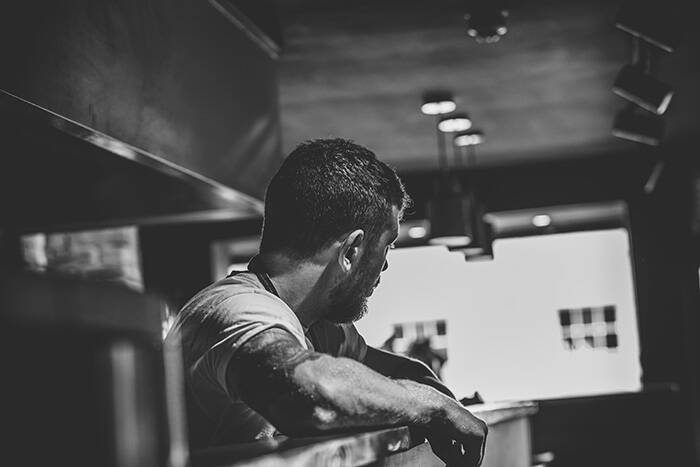
Chef fatigue.
Cooking is a creative profession, especially at the highest level. There is social pressure to constantly come up with something new. Something that has never happened before and that has been thought out to perfection. A chef is only as good as his/her last creation and this puts the profession of a chef into a straitjacket of creativity. It’s the reason why, in 2010, Ferran Adrià quit the Spanish restaurant El Bulli. It was an important signal that received a lot of approval from chefs around the world who recognized themselves in his situation i.e. feeling stressed and burnt-out.
Lonely at the top.
Being a chef can also be a lonely profession. There is only one reputation at stake – yours. You can never fully be a part of your brigade de cuisine. As a chef you are the boss, the manager and the entrepreneur. You stand alone. Of course there are others who are in the same situation as you are, but the time to consult with colleagues is often lacking.
Cooking is an emotional profession.
Pressure and depression.
The kitchen is always under the microscope. A small misstep or a missing detail can make or break a reputation. The tragic high-profile lows are the chefs who put an end to their lives after the loss of a Michelin star but, of course, there are countless others who undergo some serious soul-searching after being given a bad review, losing a point in the Gault Millau or receiving a complaint. Those who put their heart and soul into their work are disproportionately affected by criticism – especially if that criticism can have a disastrous impact on their business results.
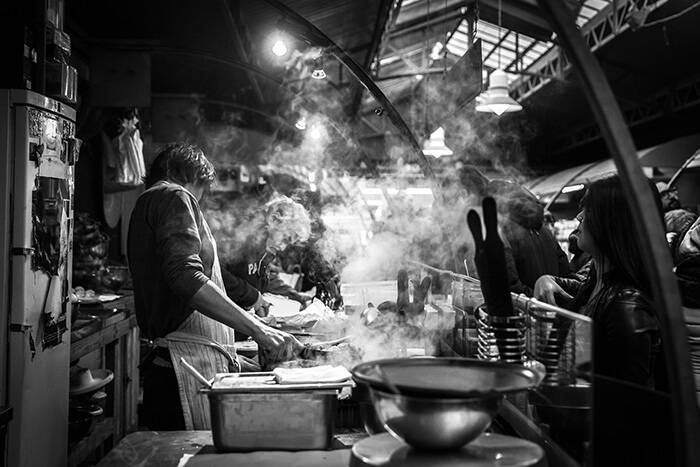
The new normal.
In 2014, Flinders University in Australia published a study into the use of alcohol, tobacco and drugs among cooks in training. Students indicated that these substances were often used in the kitchen. They concluded that, although their use is always a personal choice, the stress, social acceptance and the easy availability of alcohol, drugs and tobacco creates a culture that makes the use of these substances normal.
If cooking is rock and roll then the chefs are the stars.
The art of communication.
Cooking is an emotional profession, but in many kitchens there is little room for emotions. Chefs are not talkers; they are often introverted hard workers. There is, of course, noise, but mainly when things reach boiling point, that’s when the screaming, swearing and sometimes even throwing begins. It is an admission of weakness, a desperate act at the moment when control threatens to slip away, because shouting is not necessary if the kitchen is running smoothly. And if the kitchen is not running smoothly, then all the responsibility ultimately lies with a single individual: the chef. The sensitive talents burn out.
Kitchen culture.
If cooking is rock and roll then the chefs are the stars. But as hip as the industry is, the working conditions are somewhat medieval. A break is a luxury, performance appraisals almost never happen and a complaints box for the staff seems like something from a parallel universe. The culture of the kitchen demands dedication, devotion, endless energy and an unrelenting desire to achieve perfection. All this requires sacrifices, usually in the form of free time and rest.
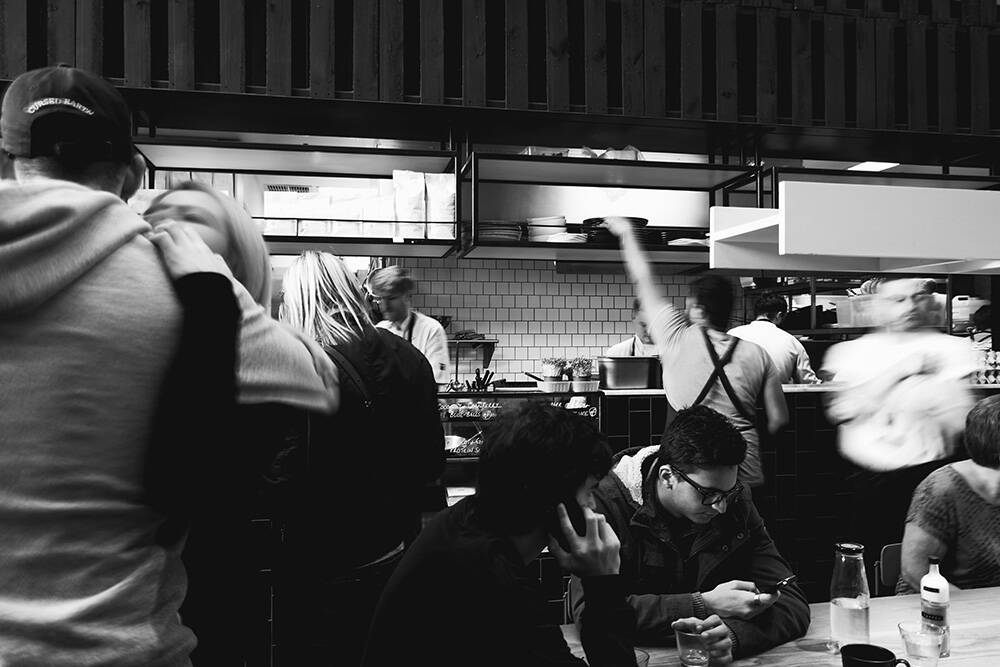
Joost Scholten Xiao-Er Kong
The kitchen has a culture of working hard, not complaining and laughing at problems. But behind the romance, there is a great deal of misery. Drink, drugs and depression are just as common in many kitchens as a mandoline and a whipped cream dispenser.
A working week of 70 hours raises no eyebrows in the kitchen, much like the constant pressure, the, let's say, 'direct' manners and the omnipresence of alcohol and other narcotics. No wonder so many kitchen staff members fall victim sooner or later to depression, fatigue, addiction and problems in their private life. What are the pitfalls?
The risks of the job
the dark
side of the
kitchen.

It’s hard to maintain a relationship when you work nights, weekends and long days. American research on employees in the hospitality industry shows that the number of divorces in the food sector is well above average. Bartenders top the list, but maintaining a relationship if you’re in the kitchen was also shown to pose a challenge. Well-known examples of successful relationships often consist of partners who both work in the hospitality industry or even at the same company.
Private and Personal Life
Working in the kitchen is a constant adrenaline rush. It attracts people who are creative, but also, more often than not, people who are compulsive and looking for excitement. These people push the traditional boundaries, both within themselves and others. Since the legendary ‘White Heat’ came on the scene, the list of bad boy chefs has only grown, and that’s no coincidence. As long as we continue to structure the kitchen to function as a machine room that runs according to military precision, a place that demands long hours and a constant flow of creativity, chefs will continue to be obsessive people with the need to blow off steam once in a while.
The characteristics of a chef.
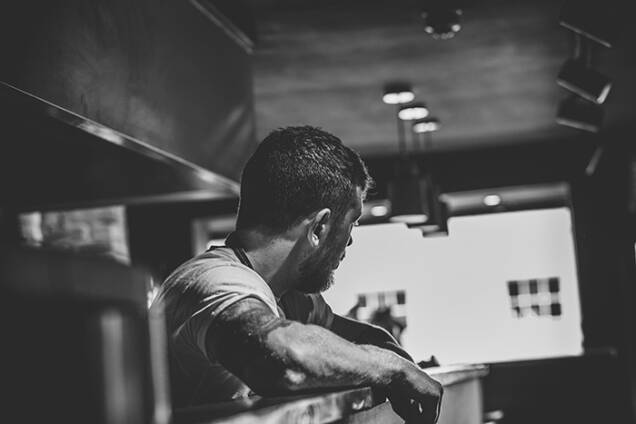
Cooking is a creative profession, especially at the highest level. There is social pressure to constantly come up with something new. Something that has never happened before and that has been thought out to perfection. A chef is only as good as his/her last creation and this puts the profession of a chef into a straitjacket of creativity. It’s the reason why, in 2010, Ferran Adrià quit the Spanish restaurant El Bulli. It was an important signal that received a lot of approval from chefs around the world who recognized themselves in his situation i.e. feeling stressed and burnt-out.
Chef fatigue.
Being a chef can also be a lonely profession. There is only one reputation at stake – yours. You can never fully be a part of your brigade de cuisine. As a chef you are the boss, the manager and the entrepreneur. You stand alone. Of course there are others who are in the same situation as you are, but the time to consult with colleagues is often lacking.
Lonely at the top.
Cooking is an emotional profession.
The kitchen is always under the microscope. A small misstep or a missing detail can make or break a reputation. The tragic high-profile lows are the chefs who put an end to their lives after the loss of a Michelin star but, of course, there are countless others who undergo some serious soul-searching after being given a bad review, losing a point in the Gault Millau or receiving a complaint. Those who put their heart and soul into their work are disproportionately affected by criticism – especially if that criticism can have a disastrous impact on their business results.
Pressure and depression.
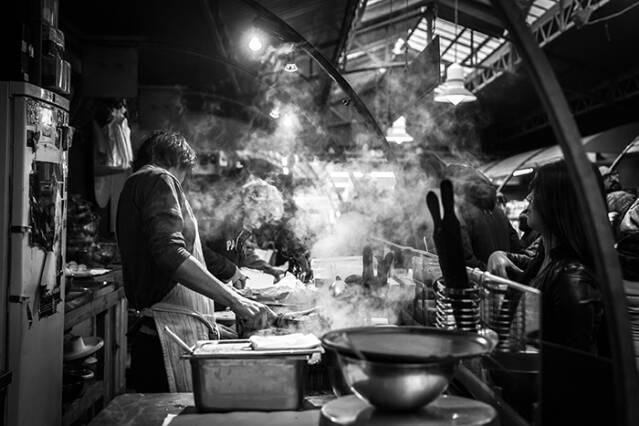
In 2014, Flinders University in Australia published a study into the use of alcohol, tobacco and drugs among cooks in training. Students indicated that these substances were often used in the kitchen. They concluded that, although their use is always a personal choice, the stress, social acceptance and the easy availability of alcohol, drugs and tobacco creates a culture that makes the use of these substances normal.
The new normal.
Cooking is an emotional profession, but in many kitchens there is little room for emotions. Chefs are not talkers; they are often introverted hard workers. There is, of course, noise, but mainly when things reach boiling point, that’s when the screaming, swearing and sometimes even throwing begins. It is an admission of weakness, a desperate act at the moment when control threatens to slip away, because shouting is not necessary if the kitchen is running smoothly. And if the kitchen is not running smoothly, then all the responsibility ultimately lies with a single individual: the chef. The sensitive talents burn out.
The art of communication.
If cooking is rock and roll then the chefs are the stars.
If cooking is rock and roll then the chefs are the stars. But as hip as the industry is, the working conditions are somewhat medieval. A break is a luxury, performance appraisals almost never happen and a complaints box for the staff seems like something from a parallel universe. The culture of the kitchen demands dedication, devotion, endless energy and an unrelenting desire to achieve perfection. All this requires sacrifices, usually in the form of free time and rest.
Kitchen culture.
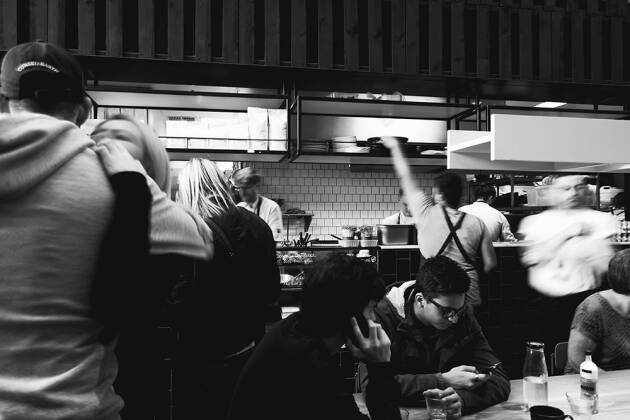
Joost Scholten Xiao-Er Kong
The kitchen has a culture of working hard, not complaining and laughing at problems. But behind the romance, there is a great deal of misery. Drink, drugs and depression are just as common in many kitchens as a mandoline and a whipped cream dispenser.
A working week of 70 hours raises no eyebrows in the kitchen, much like the constant pressure, the, let's say, 'direct' manners and the omnipresence of alcohol and other narcotics. No wonder so many kitchen staff members fall victim sooner or later to depression, fatigue, addiction and problems in their private life. What are the pitfalls?
The risks of the job
the dark
side of the
kitchen.





